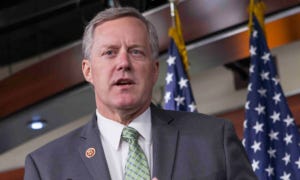
During Republican primaries, we often hear the "Buckley Rule" referred to by conservative commentators. Its popular understanding (which doesn't quite match up with its literal meaning as put forth by William F. Buckley Jr.) is that Republicans should support the most conservative candidate that is electable.
The concept has always made sense to me. I believe in conservative governance and thus I support conservative candidates, but political viability is crucially important. If the most conservative candidate in the room can't beat their Democratic opponent in a general election (for whatever reason), I don't see the sense in choosing that person over a primary candidate that can.
I generally feel the same way about policy. We live under a two-party system of divided government, so when it comes to legislation, we're rarely going to get exactly what we want...even when the party we align with is in power. Legislators have it within them to present an absolutely brilliant bill that fixes a very serious problem — a bill so great it would draw a tear of pride from every true-blue conservative in the country. But if that bill can't get enough support to pass through both houses of congress and be signed into law by the president, what good is it other than for symbolic purposes?
Now, let's talk about an imperfect and partial legislative solution. What if there were an opportunity to take some specific elements of that amazing bill, get them passed and signed into law right away, and then work on additional conservative reforms separately? Wouldn't it make sense to at least get the ball rolling? Isn't a bird in the hand worth two in the bush, especially when the alternative may be no birds at all?
Well, apparently the answer to that question is no, based on what happened yesterday with the American Health Care Act.
You see, the AHCA wasn't the sweeping "repeal and replace" solution to Obamacare that conservatives have long dreamed of. Rather than working off of the false premise that the system could be reverted back to the long-gone insurance market of 2009, it reflected the reality that without a thoughtful transition back to the free market, millions of people currently dependent on Obamacare would be tossed off of their coverage. Furthermore, a full repeal bill would never have made it past the 60-vote majority threshold of the U.S. Senate.
Instead, the AHCA was designed as a compilation of budgetary-related items that would dismantle parts of Obamacare using a reconciliation process which only requires a 50-vote majority. If it had garnished enough Republican support in the House, it would have almost certainly gone on to become law. From there, in separate phases, regulatory adjustments and additional legislation would have been used to achieve increased insurance market competition and other consumer savings.
That didn't cut the mustard for a lot of conservatives, including some in the media, think tanks, the House Freedom Caucus, and a handful of influential U.S. senators. They refused to even acknowledge the broader plan beyond the AHCA, and instead framed the bill as Obamacare-lite. They joined the Democratic party and much of the media in working to derail the effort. Even after receiving multiple concessions from the bill's proponents, the Freedom Caucus (a conservative coalition of roughly 30 members of congress) refused to budge.
The result: The AHCA went down in flames, courtesy of the party that created it, and a tremendous opportunity was wasted. After seven years of campaigning against Obamacare, conservative Republicans single-handedly saved it. President Obama's signature legislative achievement will remain intact indefinitely, while it continues to fall apart, and scores of Americans suffer under its devastating consequences.
Politically, this was a crushing political defeat, not just for President Trump and Speaker Paul Ryan (who did their best to save the bill), but for those of us who are more interested in shrinking government and expanding freedom (even in small, incremental steps) than we are simply preaching about it through soaring rhetoric. The GOP looks absolutely feckless right now, despite being the party in control of Washington. President Obama has to be loving this.
While some of the opposition to the bill was earnest and understandable, the unfortunate reality is that some sectors of the conservative establishment are more motivated to spread sanctimonious outrage than actually fix problems. If that weren't the case, this bill would have received the numbers it needed.
So where do we go from here? Should the Republicans give up their efforts to replace Obamacare? The answer is no, but it's tough to imagine the situation getting better.
The GOP has sent out the signal that it's not willing to put forth a serious solution that can actually be signed into law. The party squandered an extraordinary amount of political capital right out of the gate, under this new Republican administration. The shameless demagoguery from both sides of the aisle has again left the public scared and confused. And if anyone thinks that President Trump is going to waste more time on this, they haven't been listening to his words on health care over the past two years.
The truth is that health care was never a central issue for Trump, and it's really quite surprising that he backed the bill as strongly as he did (which he deserves credit for). In the primary, he actually campaigned on universal healthcare (very different than the AHCA), and in the general election, he barely spoke on the topic. He never demonstrated any real knowledge of the issue, and one gets the sense that he'd be perfectly happy to move on from it entirely — especially with this debacle earning his long bragged-about deal-making talents are large dose of mockery.
Did Paul Ryan move too quickly on health care? Probably, but he did so because conservatives demanded it (including many of the same ones who eventually left him high and dry). Ryan went to great lengths to seek compromise with the different wings of his party, but some just weren't going to be happy until the bill was turned into something that couldn't possibly become law.
So, after seven years of assurances, we're not going to have a new law — at least not anytime soon. And those among us who are suffering under crippling health care costs (and no choices) will continue to suffer. Obamacare will continue to fail.
The only difference is that now, the Democrats aren't the only ones responsible for it.












